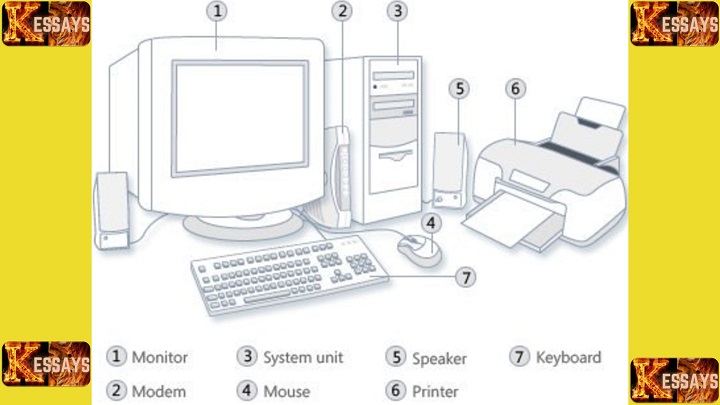Introduction to Computer Systems
In today's rapidly evolving technological landscape, computer systems play an integral role in various aspects of our lives. From personal tasks to complex industrial processes, computer systems have revolutionized the way we operate. This handbook aims to provide a comprehensive understanding of computer systems, their importance, characteristics, and their role in shaping our modern world.
Understanding Computer Systems
A
computer system refers to an interconnected set of hardware, software, and data components that work collaboratively to perform specific tasks or functions. These systems range from personal computers and laptops to sophisticated server arrays and cloud-based infrastructures. Computer systems consist of several core components, each with its unique function.
- Definition of Computer Systems: A computer system is an interconnected assembly of hardware, software, and data components that collaborate to execute specific tasks or functions.
- Diversity of Systems: Computer systems encompass a wide spectrum, ranging from personal computers and laptops to intricate server arrays and cloud-based infrastructures.
- Core Components: These systems consist of several essential components, each fulfilling a distinct role within the overall framework.

Components of Computer Systems
Central Processing Unit (CPU)
The Central Processing Unit, often hailed as the brain of the computer, embodies the intricate powerhouses responsible for executing a myriad of tasks. From interpreting instructions encoded in software programs to conducting complex calculations, the CPU forms the nucleus of computer systems' operations. Moreover, it adeptly manages the data processing activities crucial for seamless functionality.
Memory
Within the realm of computer systems, memory stands as an indispensable entity, facilitating the rapid retrieval of both data and instructions. Random Access Memory (RAM) and cache, among other memory levels, provide the essential mechanism for swift access to data required during ongoing processes. This dynamic memory hierarchy ensures that the computer system operates with efficiency and responsiveness.
Storage Devices
The stalwart guardians of data persistence, storage devices epitomize the safeguarding of information for prolonged periods. Hard drives, with their enduring reliability, coexist harmoniously with cutting-edge solid-state drives (SSDs), offering enhanced speed and durability. These devices act as the reservoirs of data and applications, enabling long-term accessibility and retrieval.
Input and Output Devices
A symphony of user-computer interaction unfolds through the medley of input and output devices. The tactile keystrokes of keyboards, the precision of mice, the visual canvas of monitors, and the tangible output from printers converge to create a comprehensive interface. These devices become the conduits through which users communicate, instruct, and receive feedback from the computer system.
Motherboard
Undoubtedly the architectural cornerstone, the motherboard orchestrates the intricate ballet of hardware components within computer systems. This main circuit board serves as the central nexus that connects and commands diverse entities, fostering the harmonious dialogue among various elements. It is through this intricate integration that the computer system's holistic functionality is sustained.
Software
In the virtual realm of computer systems, software takes the reins, providing the intangible framework that empowers users to embark on a plethora of tasks. The operating system, be it the familiar faces of Windows, macOS, or Linux, endows the computer system with its core functionality. Accompanying applications supplement this foundation, enabling users to perform tasks that span the gamut of human endeavors.
Importance of Computer Systems
Efficiency and Automation
The intrinsic value of computer systems manifests in their ability to usher in a new era of efficiency and automation. These systems meticulously streamline multifarious tasks, curbing human errors through mechanized processes that transcend human limitations. This proficiency not only enhances productivity but also cultivates a landscape of accuracy and reliability.
Global Connectivity
The marriage of computer systems with the boundless expanse of the internet results in an unparalleled web of global connectivity. This interconnected tapestry permits instantaneous communication, the cultivation of collaborative ecosystems, and unfettered access to a vast repository of information. Such connectivity redefines the scope of human interaction and the dissemination of knowledge.
Data Handling and Analysis
The prowess of computer systems shines brightly in their adeptness at grappling with colossal volumes of data. Swift processing capabilities enable businesses to engage in data-driven decision-making, extracting valuable insights from the intricate tapestry of information. In this arena, computer systems transform data into actionable intelligence, heralding an era of informed choices.
Innovation Catalyst
Embedded within the DNA of computer systems lies the seed of innovation, poised to germinate novel ideas and groundbreaking technologies. These systems provide the fertile ground upon which inventive minds cultivate new applications, solutions, and methodologies. Through this catalytic role, computer systems become the cradle of progress, pushing the boundaries of human ingenuity.
Personal Empowerment
At the heart of every personal computer system resides the potential for personal empowerment. Individuals wield these tools to learn, create, and interact with the digital universe. This empowerment transcends geographical confines, unlocking access to vast educational resources, creative platforms, and avenues for self-expression.
Characteristics of Computer Systems
Speed
Computer systems are emblematic of unparalleled speed, executing tasks with alacrity that defies traditional human capabilities. This swift execution makes them indispensable for tasks that demand rapid responses and real-time processing, from financial transactions to virtual simulations.
Accuracy
The hallmark of precision distinguishes computer systems, as they consistently deliver accurate results devoid of human fallibility. This intrinsic trait of accuracy minimizes errors that often accompany manual processes, ensuring outcomes that meet stringent standards of correctness.
Versatility
Computer systems assume a chameleon-like versatility, adapting seamlessly to an expansive spectrum of tasks. They effortlessly navigate through intricate calculations, multimedia processing, and intricate simulations, embodying a capability that mirrors the diversity of human endeavors.
Scalability
The adaptive nature of computer systems is epitomized by their scalability, enabling them to evolve alongside changing requirements. This innate flexibility empowers organizations to expand resources or accommodate increasing demands, ensuring a sustainable alignment with growth trajectories.
Reliability
Reliability is a bedrock characteristic of computer systems when nurtured through diligent maintenance. These systems exhibit high levels of dependability and uptime, providing a stable foundation for critical operations, from financial transactions to life-saving medical procedures.
Storage Capacity
Computer systems boast expansive storage capacities, effectively acting as digital vaults capable of housing vast troves of data. This storage prowess engenders convenient retrieval and archiving of information, ensuring that vital data resources remain accessible when needed.

Characteristics of Computer Systems
Computer systems embody a rich array of characteristics that collectively shape their capabilities and functionalities, elevating them to the forefront of modern technological advancements. These attributes underscore the pivotal role that computer systems play in reshaping our world.
Speed
The hallmark of speed defines computer systems as nimble entities capable of executing tasks with remarkable rapidity. Operating at the microsecond scale, these systems excel in time-sensitive operations, such as high-frequency trading, real-time data processing, and instantaneous communication. This intrinsic swiftness positions computer systems as invaluable tools for modern-day endeavors that hinge on split-second decisions.
Accuracy
Computer systems stand as beacons of precision, delivering consistent and accurate results that surpass the capabilities of manual processes. Shielded from the vagaries of human error, these systems produce outcomes that adhere rigorously to predefined algorithms and mathematical principles. This attribute is particularly crucial in domains where precision is non-negotiable, including scientific research, engineering simulations, and medical diagnostics.
Versatility
The mantle of versatility graces computer systems, endowing them with the capacity to seamlessly transition between an expansive spectrum of tasks. Whether engaged in complex mathematical calculations, deciphering human languages, manipulating intricate images, or orchestrating multimedia experiences, computer systems adeptly navigate this diverse terrain. This adaptability ensures that a single machine can serve myriad purposes, catering to the multifaceted demands of modern society.
Scalability
An inherent feature of adaptability, scalability bestows computer systems with the capability to expand their resources and functionalities in response to evolving needs. This trait ensures that as demands burgeon, these systems can be easily upgraded, allowing for the accommodation of increased workloads and the integration of novel technologies. This malleability not only enhances efficiency but also lays the foundation for sustainable growth in a dynamically changing landscape.
Reliability
Nurtured by meticulous maintenance, the attribute of reliability encapsulates the steadfastness of computer systems. These systems exhibit commendable levels of dependability and uptime, rendering them suitable for critical applications that demand unwavering stability. From financial transactions and medical equipment to air traffic control systems, the reliability of computer systems underpins the safety and efficiency of vital operations.
Storage Capacity
The prowess of storage capacity distinguishes computer systems as digital repositories capable of housing vast oceans of data. This attribute facilitates the convenient storage, retrieval, and archiving of information, regardless of scale. From personal documents to enterprise databases, computer systems stand as fortresses guarding valuable data resources, enabling efficient access and management.
Therefore
, the characteristics that embellish computer systems underscore their pivotal role in modern society. Speed, accuracy, versatility, scalability, reliability, and storage capacity coalesce to elevate these systems beyond mere machines, transforming them into indispensable tools that propel progress across diverse sectors. Through their unparalleled attributes, computer systems have not only redefined the boundaries of human achievement but also forged a path toward a future where innovation and efficiency reign supreme. Understanding and harnessing these characteristics is tantamount to unlocking the boundless potential that computer systems offer in shaping the world we inhabit.

Conclusion
In conclusion, computer systems are the backbone of our modern society, driving progress, efficiency, and innovation. Their
intricate architecture and components work harmoniously to execute tasks that have transformed various aspects of our lives. From personal computing devices to powerful server clusters, the importance of computer systems in our interconnected world cannot be overstated. Understanding their components, characteristics, and capabilities is crucial for both consumers and professionals in this digital age.
Indeed, computer systems have revolutionized how we work, communicate, and interact with the world around us. As technology continues to evolve, a solid grasp of computer systems' fundamentals will remain a valuable skill, empowering individuals and organizations to harness the full potential of these remarkable creations.



Comments are closed!